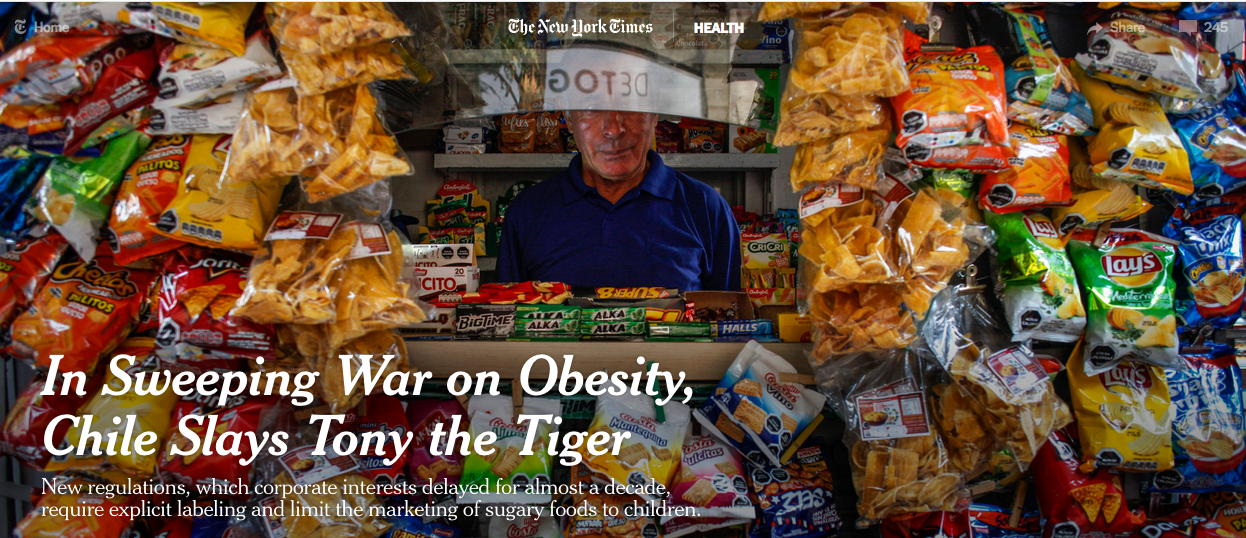The new laws do not ban the sale of snack foods containing high sugar, salt, fat and calories. But they now require black warning labels to appear on the front of the packages — they also prohibit the sale of these unhealthy products in schools. Advertising aimed at children has been discontinued. Even Tony the Tiger is banned from Frosted Flakes boxes and Chester the Cheetah has been removed from all Cheetos packaging (I always hated the Cheetos Cheetah. He teaches children bad manners including smearing yellow Cheetos dust onto other people's clothing).
Over the last several decades, Americans went from consuming a few pounds of sugar each year to ingesting approximately 150 pounds annually! The move from white sugar produced from sugar cane to high fructose corn syrup markedly lowered the price of sugar — and with lower prices, portion size and total sugar consumption grew. Chile has also added an 18% tax on high sugar beverages. They are still much cheaper than before the advent of corn sugar sweeteners. Mayor Bloomberg tried to do this in New York City and failed.
In 1981, Pepsi and Coke both made the change to using corn sugar. Soda became so cheap that McDonald’s moved their soda dispenser from behind the counter to inside the dining area. It was cheaper to allow a customer to drink unlimited soft drinks than to pay an employee to fill empty cups. Instead of tracking soda consumption, management would simply track the number of cups used.
In the 1970s, most people in the world were thin. There are still areas where food is in short supply, but mostly these are areas where war or fallen governments prevent the distribution of food. American produced sugar is so cheap that huge regions of the planet now have high obesity and diabetes rates. Diabetes was virtually unknown in China a few decades ago — now it is a rising epidemic.
Like many businesses, the food industry has undergone consolidation, resulting in a few huge companies controlling most of the trade. They can (and do) lavish money on politicians worldwide, and lobby heavily to protect their business.
Sadly, one of the responses of the food industry in Chile has been to remove sugar and replace it with artificial sweeteners. Those chemicals raise insulin levels, just like sugar and have many of the same bad effects on health. In lab experiments, rats given Diet Coke weighed 50% more than water drinking controlled rats after just three months!
As individuals, we all have the power to change our food choices. But, as a society, it helps a great deal if consumers can clearly see which foods are unhealthy. It is especially effective if these labels are plainly visible to children. We also need to remove unhealthy snacks from schools and forbid harmful food advertising directed at children.
The rise in food related disease takes many years. As with smoking, deaths occur four to six decades after the habit begins. If the U.S. launched a program to reduce consumption of sugar, processed carbohydrates, salt and unhealthy fats, it could take over thirty years to document some major improvement in health statistics.
Cigarette consumption peaked in 1968 when advertising was banned. Lung cancer deaths continued to rise and peaked in 1998. In order not to die of lung cancer, a smoker would need to quit smoking thirty years before they would otherwise die of the disease. People don’t suddenly get a heart attack at sixty or seventy — they have been gradually accumulating the problem for decades.
By changing the detrimental advertising sales patterns of processed foods, it will mostly benefit our children when they become mature adults. The earlier we start, the sooner the changes can begin.
I congratulate the people of Chile for their courageous step and wish them good health. If only the American people were to take such a step.

 RSS Feed
RSS Feed